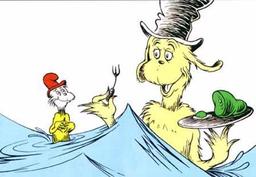 I do like green eggs and ham Sam I am! I do like green eggs and ham Sam I am! Humans are fairly perverse creatures. We seem to operate best when we are challenged or told we can't or shouldn't do something. Truth or Dare continues to be one of the most popular tween and teen party games. I am sure there are multiple variations since I was a member of that esteemed age group, but the illicit or secretive nature of these games is still the draw or incentive to play them. Humans quite simply love challenges; we plainly delight in proving other people wrong. Theodore Geisel, the beloved Dr. Suess, wrote The Cat and the Hat using only two hundred and twenty different words. After The Cat and the Hat was published it became an instant best seller because it offered, in an appropriate and interesting story, basic words for children who were learning to read. Geisel's publisher bet him, fifty dollars cash, that he could not write a book using only fifty different words. A few years later, Green Eggs and Ham, a book with exactly fifty distinct words, was published and Sam I am became a household name for generations of children. Dr. Suess went on to write many more classics; I wonder if the betcha can't in this instance, may have been one of the most influential wagers in the history of the written word. Sugata Mitra, the 2013 Ted Talk winner, takes another approach with similar results. His challenge is indirect, however, decidedly intentional. In fact, he uses the word pedagogy to explain his methods in the Hole in the Wall experiments in India (If you have not watched his Ted Talk, it is well worth your time. He will also be keynoting the May 2015 AERO conference on Long Island. Sadly, I will not be attending.) Mitra placed computers in a wall in the slums of India and watched children teach themselves how to use them. Yes, he is a teacher; nevertheless, he does not stand or hover over children to direct their learning experiences, he lets them discover everything on their own. When the children ask him how something works, he says in his bumbling way, “I really don't have the foggiest.” And then stands back (actually leaves) and watches them figure everything out as a group, by teaching each other. After setting up several different Hole in the Wall experiments, over many years (with scientifically recorded and replicated data) all over India, he has determined that children learn when they are interested and when they are offered these oblique challenges. In some instances, these overtly poor kids taught themselves English so they could figure out how to use the software and how to browse the Internet. We humans do indeed savor a challenge! I am not at all surprised that interest, passion, and need to be contrary drives all of us to learn, or be creative. I would strenuously argue that these are all the essential building blocks for self-motivation and yes, self-directed learning. We gravitate, as human-beings (as do most primates), to those things that offer excitement, fun, a level of difficulty, and enjoyment. Our culturally accepted educational methods or pedagogy, plainly stated, are destroying the very desire to learn. Instead of challenging students, we provide them the complete opposite by spoon feeding them information, rules, and activities, so they can complete the tasks we deem essential. When they do get a few minutes to themselves, they often choose to disconnect and relax with passive entertainment. Which results in direct feedback about being lazy and unmotivated. It is a vicious cycle. Many youth do not have intrinsic motivation because they have been externally stimulated their whole lives. But yet, we expect them to take initiative and make good decisions when they arrive at college or enter the workforce. I present the following challenge to all parents, teachers, care-givers, tutors, after-school volunteers, or for that matter, anyone who interacts with children in anyway. The next time a child asks you a question, I betcha will find it hard to step back, shrug and say pensively, “hmmm, I'm not really sure… ” Try it, and I wager that once you are truly able to get out of the way, you too will be addicted to offering the magic of personal discovery that brings the awesome light of pure satisfaction, delight, and joy to a child's face.
0 Comments
Your comment will be posted after it is approved.
Leave a Reply. |
|
© 2024 Whole Learners, Inc. 501(c)3
Deep Root Center
48 Riverside Drive, Canton, NY 13617
315*323*1435/[email protected]
Deep Root Center
48 Riverside Drive, Canton, NY 13617
315*323*1435/[email protected]




